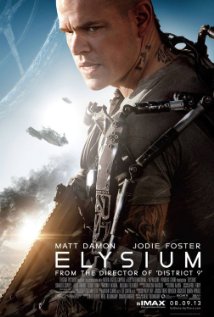Sci-fi, 109 Minutes, 2013
This is writer/director Neill Blomkamp’s [IMDB] highly anticipated follow-up to his surprise 2009 hit, “District 9” [IMDB]. While vastly different in tone and scope the two films share a distinctive feel. With a few script changes they may have quite believably been set in the same timeline. There’s a closeness, an immediacy, to the direction and staging that permeates everything.
By 2154 overpopulation, pollution and industry have turned the Earth into a wrecked and shattered slum. Those that can, work in the factories. Those that can’t get by as best they can. Law and order has been relegated to robots and automated systems. The wealthy and powerful have migrated off-world to an ultra-modern space station, Elysium. There they enjoy around the clock attendance, all the best of everything and, most importantly, access to near-miraculous personal healing devices not available on Earth.
Max (Matt Damon [IMDB]) and Frey (Alice Braga [IMDB]) were orphans who grew up dreaming of making it off Earth. Neither could. After some mistakes and prison time Max is working and trying to stick to the straight and narrow. Then things go wrong on the job. He’s fatally irradiated, shoved out the door and given five days to live. In a desperate attempt to reach Elysium and the magic healing machines he agrees to undertake a dangerous, highly illegal mission for a former associate.
He’s equipped with a cybernetic exoskeleton to help overcome his weakness and given some very interesting guns. When things go pear-shaped he reconnects with Frey, now a nurse, to help him and drags her – and her terminally ill daughter – into his problems. Things quickly spiral out of control. as expected.
As noted the movie has a highly distinctive look. The presentation of technology (with the exception of the magic healing machines) is gritty and, at least passably, realistic considering the time. There’s a roughness, a sense of slapdash carelessness to the tech that speaks eloquently to its ubiquity. The special effects, overall, are subdued and subtle; used more for setting the scene than carrying it. With the exception of the outer-space sequences there’s a noticeable and appreciated lack of CGI.
The story is human and sincere, but also heavy-handed and preachy. There’s an agenda here very little elegance in how it’s conveyed. When Max is irradiated on the job the head of the factory is more worried about replacing the sheets in the infirmary. The police force on Elysium is “Homeland Security”. Poor people speak Spanish; rich people speak French.
The implication is that the rich are spoiled and selfish and able – but not willing – to help everybody. It doesn’t detract completely but is a step back from the more subtly presented social commentary of “District 9”. The ending is also, to be blunt, kind of – just a little bit – stupid as hell. I won’t spoil anything, but it’s been a while since I’ve seen “computer hacking” so terribly portrayed. Changing the world should take just a little more than changing a variable from “illegal” to “legal”.
The ending goes off the rails, just running for curtain, literally in the very last minutes. The rest of the movie is high-concept, visually engrossing sci-fi of a quality rarely seen. It may wear its politics on its sleeve, but it does exactly what sci-fi, at its best, is supposed to do: allow us to reflect on our own issues and foibles in a safe, detached manner. It’s not as good as “District 9”, but not much is.

